|
|
|
Sort Order |
|
|
|
Items / Page
|
|
|
|
|
|
|
| Srl | Item |
| 1 |
ID:
087544
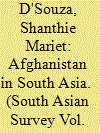

|
|
|
|
|
| Publication |
2009.
|
| Summary/Abstract |
Afghanistan seems to be sliding into chaos notwithstanding the initial euphoria that followed the toppling of the Taliban regime. The long-term stability of Afghanistan is mainly contingent upon its integration in a regional cooperative framework. The Afghanistan Compact adopted at the London Conference in January-February 2006 identified regional cooperation as a main plank of the international community's reconstruction strategy. However, not all stakeholders in the region share similar perceptions or interests in promoting regional cooperation. This article seeks to examine whether regional cooperation in South Asia could be an effective mechanism to bring in long-term stability in Afghanistan. Will regional cooperation augment Afghanistan's capacity to deliver basic needs to the Afghan people? Would its entry into the South Asian fold contribute to peace in that country?
|
|
|
|
|
|
|
|
|
|
|
|
|
|
|
|
| 2 |
ID:
142616
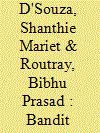

|
|
|
|
|
| Summary/Abstract |
Its long history and destabilising impact notwithstanding, banditry has received scant academic attention in India. Confined mostly to occasional and incident-driven media reportage, the socioeconomic factors that fuelled insurgencies and banditry and the milieu which provided a context for the operations of these outlawed movements received little attention. Cinematic representation of the social banditry phenomenon in the country, based on little or no first-hand research, as a result, suffered from ingenuousness and failed to emerge from the romanticised depiction of insurgency and terrorism which Bollywood, India's movie industry, is known for. Bandit Queen, the biopic of Phoolan Devi, in contrast, stands apart. Scathing criticisms regarding its use of sex as a tool for commercial success notwithstanding, the movie succeeds in drawing the viewers' attention to the persisting social cleavages in India. Using rape as its central theme, it shocks its audience into acknowledging the reality and relevance of social banditry in a country where governance remains an absent entity for a vast majority of its people. That most Bollywood movies depicting social issues have continued to remain aground in romanticism and irrelevance makes Bandit Queen even more relevant in times to come.
|
|
|
|
|
|
|
|
|
|
|
|
|
|
|
|
| 3 |
ID:
079620
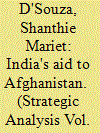

|
|
|
| 4 |
ID:
083933
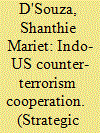

|
|
|
|
|
| Publication |
2008.
|
| Summary/Abstract |
Following the 9/11 attacks on the American homeland, India and Pakistan emerged as important states in the US-led Global War on Terrorism (GWOT). The gathering momentum in the Indo-US relations during the Clinton Presidency underwent a dramatic transformation. Although increased cooperation in defence issues is understood to have 'led' the India-US relationship to its current level, it has not culminated in enhanced counter-terrorism cooperation. This perceived lack of cooperation can be located within the perceptual differences on key security issues. This paper seeks to examine whether the upswing in Indo-US relations and claims of heightened cooperation, has led to a commensurate level of counter-terrorism cooperation between both countries.
|
|
|
|
|
|
|
|
|
|
|
|
|
|
|
|
| 5 |
ID:
088501
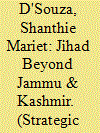

|
|
|
| 6 |
ID:
146225
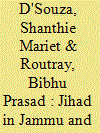

|
|
|
|
|
| Summary/Abstract |
Militant jihad as witnessed in Jammu and Kashmir (J&K) is centred around the primary objective of finding a separate homeland for the Muslims of the state. Opinion on whether this homeland would be an independent entity or merged into Pakistan remains inconclusive. And yet, this externally sponsored violent extremism, spearheaded by interlinked militant formations with significant local participation, has remained deeply religious, highlighting the alleged machinations of the Hindu Indians, both in the state and in India in general, against the Muslim population. Over the years, the objective of liberating Kashmir from Indian control has been attempted not just through an armed movement that targets the symbols of Indian state sovereignty within J&K, but has invested resources carrying violence into the Indian heartland and also making the movement transnational in character by aligning with global terror formations like the al Qaeda and the Islamic State. This paper is an examination of the shifting agenda as well as the activities of three primary militant formations operating in J&K: the Hizb-ul-Mujahideen, the Lashkar-e-Toiba and the Jaish-e-Mohammad and an assessment of the transformation of the Jihad that has bilateral, regional and international security implications.
|
|
|
|
|
|
|
|
|
|
|
|
|
|
|
|
| 7 |
ID:
085717
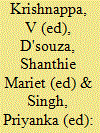

|
|
Saving Afghanistan
/ Krishnappa, V (ed); D'souza, Shanthie Mariet (ed); Singh, Priyanka (ed)
|
2009

|
|
|
|
| Publication |
New Delhi, Institute for Defence Studies and Analyses, 2009.
|
| Description |
194p.
|
| Standard Number |
9788171887538
|
|
|
|
|
|
|
|
|
|
|
|
Copies: C:2/I:0,R:0,Q:0
Circulation
| Accession# | Call# | Current Location | Status | Policy | Location |
| 054096 | 320.9581/KRI 054096 | Main | On Shelf | General | |
| 054097 | 320.9581/KRI 054097 | Main | On Shelf | General | |
|
|
|
|
| 8 |
ID:
086243
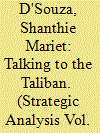

|
|
|
|
|
| Publication |
2009.
|
| Summary/Abstract |
The raging Taliban-led insurgency in Afghanistan underlines the limits of the use of military force. The lack of visible progress on the reconstruction activity and prevailing insecurity has alienated the Afghan populace in the remote villages of South and East Afghanistan. Given that the military option alone has limited utility in Counter-insurgency (COIN), there is a need to exercise an 'out-of-the-box' option to address the present stalemate. After all, effective COIN calls for optimal utilization of military and non-military means and long-term solutions are found in the political domain. In light of the present deteriorating security situation, it would be useful to examine whether exercising the option of negotiations and political reconciliation with the Taliban is a viable COIN strategy in Afghanistan. Will such measures help erode the support base for the Taliban leadership? Importantly, would such steps lead to durable 'peace' in Afghanistan?
|
|
|
|
|
|
|
|
|
|
|
|
|
|
|
|
| 9 |
ID:
083591
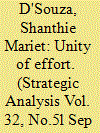

|
|
|
|
|
| Publication |
2008.
|
| Summary/Abstract |
More than six years after the initiation of Operation Enduring Freedom the Taliban and its affiliates are back, wreaking havoc on the fragile security situation and impeding development activity in Afghanistan. The Taliban-led insurgency is spreading its tentacles to new areas, with the relatively stable north swinging towards instability. This paper takes stock of the deteriorating security situation and singles out the lack of 'unity of effort' as a missing link in the international community's counter-insurgency campaign, contributing to its ineffectiveness in establishing security. There is an urgent need to first establish security, only after which can long-term sustainable progress in the political and economic spheres be achieved
|
|
|
|
|
|
|
|
|
|
|
|
|
|
|
|
|
|
|
|
|